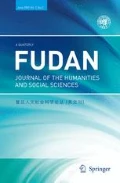Abstract
Posthumanism has in the past few years been one of the most cutting-edge theoretical topics increasingly attracting the critical attention of scholars of both humanities and social sciences. The author holds that the rise of “posthumanism” in the West during the past decades indicates that in the present era, man, like those living animals and plants on the earth, is nothing but one of the species in nature, whose existence and development to a large extent depend on natural law. It is true that posthumanism came after the crisis of humanism, but it has continuity with and transcends over the latter. It informs us that over-evaluating the role of man is by no means adequate, for man has entered into a “posthuman” stage, in which man is no longer viewed as the only species that has rational thought, nor is he the head of all the species on the earth. But man can create various wonders, some of which are even beyond man’s control. Although the rise of posthumanism has raised a severe challenge and even threat to traditional humanism and human existence, the author still hopefully finds some prospects for mankind, especially in current China where a sort of ecocivilization should be built up and digital humanities may well bridge up the gap between science and humanities.
Similar content being viewed by others
Notes
Eagleton (2004, 1).
Pollock (2011, 235).
Wolfe (2009, 47).
Badmington (2003, 18).
Ibid., 10.
Pollock (2011, 235).
Glotfelty (1996, xviii).
Tu (2001, 243–264).
Butler (1993, 95).
It is significant that in a symposium entitled “Judith Butler in China: Toward a Reconstruction of Global Humanities” organized by myself in Shanghai on August 16, 2018, Butler gave a keynote speech entitled “Interdependency and Non-Violence: A Critique of Individualism” in which she deals with the precarity and vulnerability of human beings.
Wang (2017, 14–30).
Robles (2017, 303).
Wang (2018, 350–352).
Hayles (2012, 23).
This report is made by the Department of Literary Creation and Research under the Chinese Writers Association, “Erlingyiwunian zhongguo wenxue fazhan zhuangkuang” (The State of Development of Chinese Literature in 2015), People’s Daily, May 3, 2016.
Hayles (2012, 34).
“On Scholarly Communication and the Digital Humanities: An Interview with Kathleen Fitzpatrick”, in the Library with the Lead Pipe by Andrew Lopez, Fred Rowland and Kathleen Fitzpatrick, January 14, 2015.
Benjamin (1968, 72–73).
References
Badmington, N. 2003. Theorizing Posthumanism. Cultural Critique 53: 10–27.
Benjamin, W. 1968. The Task of the Translator. In Illuminations, Harry Zohn (trans), Hannah Arendt (ed), New York: Schocken Books.
Butler, J. 1993. Bodies That Matter: On the Discursive Limits of “Sex”. New York: Routledge.
Eagleton, T. 2004. After Theory. London: Penguin Books.
Glotfelty, C., and H. Fromm, (eds.). 1996. Ecocriticism Reader: Landmarks in Literary Ecology, ed. Cheryll Glotfelty and Harold Fromm. Athens: The University of Georgia Press.
Hayles, N.K. 2012. How We Think: Digital Media ad Contemporary Technogenesis. Chicago and London: The University of Chicago Press.
Heise, U.K. (ed.). 2017. Futures of Comparative Literature. London and New York: Routledge.
Pollock, G. 2011. What Is Posthumanism? Journal for Critical Animal Studies IX(1/2): 235.
Robles, M.O. 2017. Comparative Literature and Animal Studies, in Heise, 302–313.
Tu, W. 2001. The Ecological Turn in New Confucian Humanism: Implications for China and the World. Daedalus 130(4): 243–264.
Wang, N. 2017. Gender Studies in the Post-Theoretical Era: Mainly a Chinese Perspective. Comparative Literature Studies 54(1): 14–30.
Wang, N. 2018. Humanities Encounters Science: Confronting the Challenge of Post-humanism. European Review 26(2): 344–353.
Wolfe, C. 2009. What Is Posthumanism?. Minneapolis: University of Minnesota Press.
Author information
Authors and Affiliations
Corresponding author
Rights and permissions
About this article
Cite this article
Wang, N. The Rise of Posthumanism: Challenge to and Prospect for Mankind. Fudan J. Hum. Soc. Sci. 12, 1–13 (2019). https://doi.org/10.1007/s40647-018-0242-y
Received:
Accepted:
Published:
Issue Date:
DOI: https://doi.org/10.1007/s40647-018-0242-y




